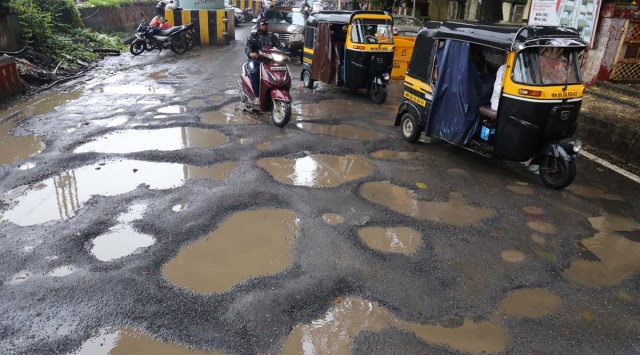Fixing potholes gets costlier, BMC to spend 25% more this yr
Ahead of monsoon this year, the BMC had floated another Rs 125-crore tender for pre-monsoon surfacing works of roads and repairing bad patches on the roads.
 Civic officials said that mastic asphalt will be used to fix the potholes from island city to the suburban belt. (Express File Photo)
Civic officials said that mastic asphalt will be used to fix the potholes from island city to the suburban belt. (Express File Photo) The pothole filling work during the monsoon this year is turning out to be expensive for the Brihanmumbai Municipal Corporation (BMC) as the civic body will spend at least Rs 100 crore for pothole filling work this year. This will be 25 per cent more than around Rs 80 crore that the civic body spent last year for the work.
Last week, the BMC finalised bidders for a Rs 36-crore tender that was floated solely for filling potholes on city roads. Civic officials said that mastic asphalt will be used by the contractors to fix the potholes from island city to the suburban belt.
The BMC has also already allocated Rs 2 crore each to 24 wards (total Rs 48 crore) to fix potholes. Before monsoon, the civic body had floated two separate tenders of Rs 40 crore and Rs 81 crore for using innovative techniques involving Reactive Asphalt and Rapid-Hardening Concrete. However, these new techniques did not bring desired results, due to which the civic body had to scrap these methods and float new tenders for pothole filling.
Civic sources said that the earmarked budget for Reactive Asphalt was brought down to Rs 9 crore from Rs 40 crore, while the budget for Rapid-Hardening Concrete was brought down to Rs 40 crore from Rs 81 crore.
“Both the new technologies are under observation since they didn’t bring out desired output, therefore, we had to halt their implementation midway. Out of the allotted fund around Rs 60 lakh have been spent so far on these two new techniques and the lion’s share of funds allotted to them remained unutilised,” P Velrasu, additional municipal commissioner (Projects), told The Indian Express.
“Therefore, to save our resources we are adopting these two new techniques and for the time being have floated a new tender for carrying pothole filling work on immediate basis,” he added.
Ahead of monsoon this year, the BMC had floated another Rs 125-crore tender for pre-monsoon surfacing works of roads and repairing bad patches on the roads. This tender was not under monsoon expenses as it was restricted to pre-monsoon work only, Velrasu said.
However, when compared with the figures spent last year, the BMC had floated a Rs 7-crore tender before Ganeshotsava for emergency repair of roads. “The new technologies of Reactive Asphalt and Rapid-Hardening Concrete were very expensive and cost us additional money, so we had to switch to the conventional methods of pothole filling. The new technologies require a dry spell of at least six hours after they are implemented, which is technically difficult in Mumbai. Therefore, we may implement these two methods in certain patches but not everywhere in the city,” said an official.
Nikhil Desai, King’s Circle resident and civic activist said that concretisation of roads of Mumbai is the only solution to curb the issue of potholes. “At present, there is no accountability in the civic body for which the administration is spending money relentlessly. Considering the high vehicular density we have in Mumbai; concrete roads are the only solution. Therefore, the civic body needs to speed up its work and try to concretise the maximum number of roads possible before the arrival of next monsoon,” Desai told The Indian Express.







